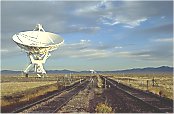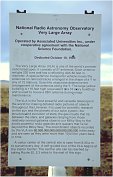This website has been archived from TrainWeb.org/southwestshorts to TrainWeb.US/southwestshorts.
This website has been archived from TrainWeb.org/southwestshorts to TrainWeb.US/southwestshorts.


| Very Large Array (VLA) - New Mexico |
|---|
The following photographs were taken on October 26, 2000.
Please click either of the pictures to see a larger image:

|

|
One of the least-known railroad operations in the southwestern United States is located at the
National Radio Astronomy Observatory's (NRAO) Very Large Array (VLA) site in western New Mexico.
Notice I didn't refer to it as a " shortline;" it's actually more
of an application of railroading than an actual railroad.
So, what is it? In simple terms, the VLA -- located off US Highway 60 between Datil and Magdalena, west of Socorro --
is an arrangement of several radio telescope dish antennas in the shape of an extremely large letter
"Y".
Each leg of the "Y" is several miles long. The dish antennas can be spaced closely together or far apart, and are moved back and forth
in accordance with the configuration requirements of those using the VLA telescope.
And how are railroads involved? Well, each "satellite dish" component of the VLA radio telescope is over 80 feet in diameter and
weighs 230 tons
-- much too large and heavy to be moved by conventional truck -- so the VLA constructed three sets of parallel railroad tracks
(one for each leg of the "Y") on which to move the antennas. The VLA's railroad tracks have no outside connections; the nearest
rail line is the BNSF El Paso Subdivision, which passes through the town of Socorro, some 45 miles to the east. The VLA does not own or
operate any locomotives -- although some were "imported" during the construction of the three lines, and then sent back off-line when
the lines were completed -- but instead uses a 90-ton crane mounted on the rails to move the antennas around during configuration changes.
Configurations changes occur only a handful of times each year (the VLA website contains a schedule) so unless you plan ahead to visit
during such a time -- or just plain "luck into" observing one -- you should expect to find the railroad dormant if you visit.
If the VLA -- illustrated in the above photo of the large dish antenna -- looks familiar, perhaps you'll recall seeing it in the movies
" 2010 "
or "Contact;" portions of both movies were filmed on location at the VLA. VLA public relations staff member David Finley has
a website
containing an excellent, highly detailed behind-the-scenes account describing the portion of "Contact" which was filmed at
the VLA. The article, entitled "Hollywood Comes to Socorro", can be found on Mr. Finley's home page at
http://www.sdc.org/~finley/.
For more information on the Very Large Array project and the National Radio Astronomy Observatory, consult the following sources:
*
VLA home page
* NRAO home page
Email the webmaster: carrxpress@hotmail.com
All images on Wes Carr's Southwest Shorts © 2000, 2001 by Wes Carr. All
rights reserved.
Wes Carr claims no affiliation with the Very Large Array, the National Radio Astronomy
Observatory,
or any shortline railroad.